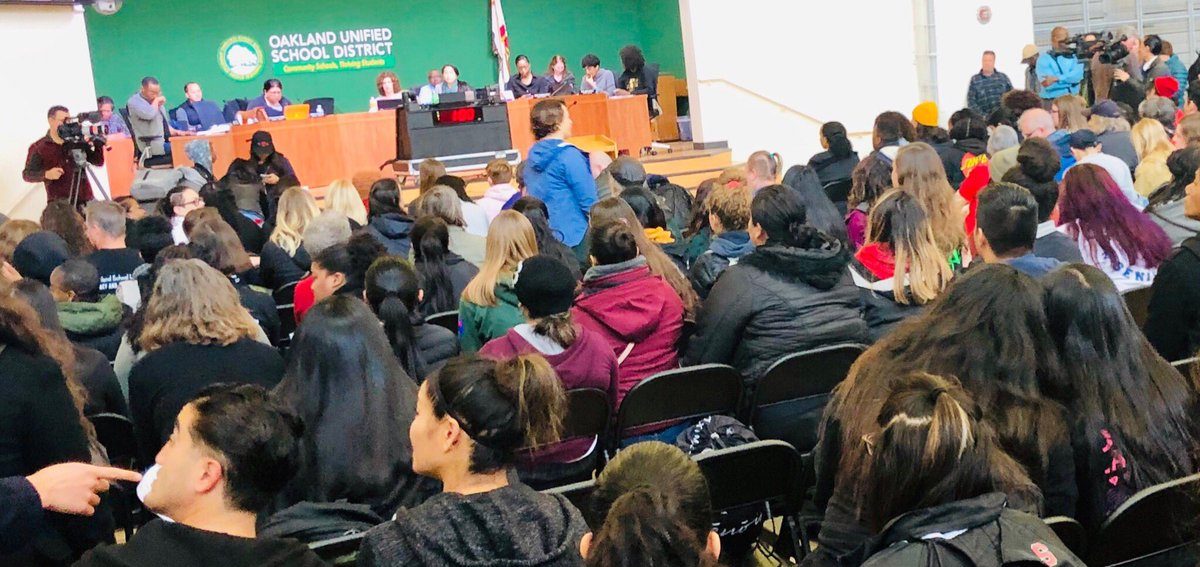With reporting from Reappropriate intern V. Huynh.
“Today is a historic day in the city of Oakland where teachers, educators are united with parents, students, and we are demanding that we have schools that our students deserve here in the city of Oakland,” said Keith Brown, President of the Oakland Education Association last month at a gathering of over 3,000 educators, students, and parents at Frank Ogawa Plaza in Oakland. The activists represented over 87 schools in the Oakland United School District (OUSD), and later marched to OUSD headquarters chanting phrases like “Education Not Incorporation” and “Invest in Equity”.
The educators were marching to demand better wages, better support for students, and the better allocation of educational resources to schools who share histories of disproportionate funding and attention. Pithily put: This one’s about the kids.
In a larger fight between OUSD and the local community over a new OUSD budget that would slash several items focused on underserved students, one of the many issues angering local activists was a proposal last month by OUSD to cut the school district’s APISA program – the only program in the district aimed towards supporting underrepresented and underserved Asian American and Pacific Islander students.
Despite the efforts of many community activists last month to launch the #SaveAPISA movement to save the APISA program, the Oakland United School District board voted last week to pass a budget that lacked funding for this initiative. The budget which resulted in the ending of APISA — the district’s only program aimed at supporting underserved Asian American and Pacific Islander students — passed by only a single vote; but that one vote is enough to eliminate necessary resources for marginalized and struggling youth.
About 17% of Oakland’s residents are Asian American or Pacific Islander (AAPI), representing numerous ethnic subpopulations. Moreover, nearly 40% of the youth AAPI population in Oakland is Southeast Asian American. Yet studies further show that Southeast Asian American and Pacific Islander students enter schools with lower proficiency in reading and math, and experience higher rates of bullying and inconsistent attendance. Lack of resources aimed at serving Southeast Asian American and Pacific Islander students contributes to significantly lower rates of high school and college graduation observed in these communities in Oakland and nationwide. Indeed, in some Southeast Asian American communities, more than one-third of adults lack a high school diploma.
Lack of resources aimed at serving Southeast Asian American and Pacific Islander students contributes to significantly lower rates of high school and college graduation observed in these communities in Oakland and nationwide.
Through community partnerships, APISA has supported and brought visibility towards several programs aimed at promoting literacy and student engagement for AAPIs. In 2017, the APISA program conducted a district-wide listening campaign that identified key challenges faced by AAPI students, including underrepresentation of AAPI communities in school curricula, lack of social and mental health resources, inadequate support for English Language-Limited students, and chronic bullying. Since that report, APISA efforts have been focused on addressing these issues for AAPI students.
For weeks, AAPI community activists in Oakland rallied to try and save the APISA program, appearing at school board meetings to share student stories about APISA and collecting over 2,500 signatures on an online petition at Change.org. And yet, school board members — including three Asian American school board members — voted against the AAPI students of the district. They cast those votes on the faulty rationale that in order to pay teachers a fair wage, programs that serve marginalized students needed to be sacrificed; this is a rationale that only pits teachers and students against one another, delegitimizes grassroots organizing, and undermines collective action.
Writes AYPAL: Building API Community Power, one of a coalition of community groups that organized around saving APISA:
It has been difficult to accept this news, that the Oakland Unified School District school board and superintendent has turned it’s (sic) backs on the students, although, it is not unfamiliar. For our Asian Pacific Islander Oakland community, this enforces the racism we face, that our stories, experiences, our communities are invisible, that we are not seen, and excluding us is an ok, perhaps even normal thing to do. The Asian Pacific Islander Student Achievement program (APISA) meant there was a place within the institution for our community along side supports for other communities of color; cutting it, along with Restorative Justice, and Foster Care supports, especially in the name of meeting the teacher demands won by the strike, demands that teachers AND students fought for, is unacceptable.
To learn more about the impact of the APISA program that the Oakland Unified School District voted to cut last week, listen to these student stories:

